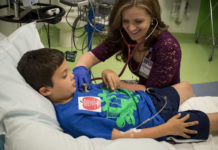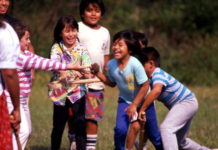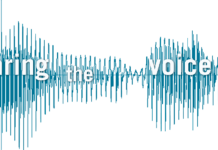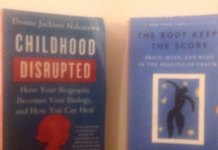Psychologists Argue for Decolonial Approach to Global Poverty
Individualist psychological models of poverty pathologize poor communities, decolonial approaches that emphasize context and interdependence may be more sustainable.
Treated Infections in Childhood Linked with Later Mental Health Service Use
Severe infections requiring hospitalizations increased the risk of hospital contacts due to mental disorders by 84% and the risk of psychotropic medication use by 42%.
New Study Investigates Cannabidiol (CBD) for Psychosis
A new study examines the effects of CBD as an adjunct therapy to antipsychotic medication for patients diagnosed with schizophrenia.
Belongingness Can Protect Against Impact of Trauma, Study Suggests
A new study explores feelings of belongingness as a protective factor for childhood trauma and adult mental health outcomes.
Why is the Field of Psychotherapy Still Fractured into Different Approaches?
Psychotherapy is dominated by contradicting schools of thought, exhibits a gap between research and practice, and repackages old ideas rather than finding clinical consensus.
Psychology Must Become a Sanctuary Discipline to Heal Racial Trauma
Researchers explore pathways of healing racial trauma in Latinx immigrant communities.
When Anxiety or Depression Masks a Medical Problem
From The New York Times: The mind and body are more connected than we often think — symptoms of anxiety and depression may result from...
Exploring Alternate Pathways to Voice-Hearing
Authors propose various pathways to the phenomena of voice-hearing in clinical and nonclinical populations.
Research Emphasizes Association Between Inflammation, Diet, and Depression
Study finds adults with a pro-inflammatory diet have a greater incidence of depression.
Recovery: Compromise or Liberation?
The 90s were labeled - rather optimistically - as the ‘decade of recovery.’ More recently, recovery has been placed slap bang central in mental health policy. Is supporting recovery pretty much good common sense? Or is the term being misused to pressure those suffering to behave in certain ways?
Data Challenges Superiority of Manualized Psychotherapy
New data fails to support the promotion of manualized psychotherapy as superior to non-manualized forms of psychotherapy.
Exploring the Tension Between Educational Psychology and Child Psychiatry
Researchers explore efforts to integrate educational psychology and child psychiatry.
Study Finds Greening Urban Land Improves Mental Health
Remediating dilapidated physical environments in urban settings can contribute to better mental health.
Four-Part Series on Drug Abuse, Trauma, and How to Heal It
In this four-part series on drug abuse and trauma, Parents Opposed to Pot provides an overview of the impact of adverse childhood experiences, how they persist, and...
Family Oriented, Home-Based Treatment Best for Youth with Symptoms of Psychosis
A pathbreaking new study out of Finland suggests that early intervention programs for youth experiencing psychotic-like symptoms may see the greatest improvement when treatment works within the home rather than in a hospital setting. The research, to be published in next month’s issue of Psychiatry Research, found greater improvement in functioning, depression, and hopelessness among teens in a new need-adapted Family and Community oriented Integrative Treatment Model (FCTM) program.
Combining Art Therapy and Mindfulness for Refugees
A new article, published in The Arts in Psychotherapy, describes the ways art therapy and mindfulness have benefitted refugees and asylum seekers in Hong Kong.
Psychosocially Oriented Psychologists Struggle Against the Medical Model
Interviews with psychosocially oriented psychologists demonstrate their experiences of discomfort with the hegemony of the medical model in their place of work and the conflicts that arise when they attempt to provide alternatives.
Exploring the Role of Community Engagement in School Psychology
New research emphasizes the impact of school connectedness and community engagement interventions on students' mental health.
“Medication for Schizophrenia: Less is More?”
Neuroskeptic weighs in on the controversy over the lack of antipsychotic dose data in the RAISE study and the misleading media coverage. He points out that one of the treatment interventions was a computerized medication management system called COMPASS, which recommends doctors use lower doses than they otherwise might.
Minimal Exercise Protects Against Depressive Symptoms in Older Adults
Study of older adults shows those who consistently exercised as little as 15 minutes, 3 times/week are less likely to develop depressive symptoms.
Emphasis on Nutrition Needed to Reform Mental Health Treatments
Even thought current mental health treatments are “suboptimal,” there is a lack of attention paid to the preventative effects of diet and nutrition. Recent studies suggests that nutritional changes can influence the risk for mental health issues and that nutritional supplements, called nutraceuticals, can be prescribed for existing conditions.
Despite Increase in Treatments, Prevalence of Mental Health Issues Climbs
Findings show that despite increases in treatment availability, the prevalence of mental health issues has not decreased.
Music Therapy Interventions Reduce Depression Symptoms in Dementia
Therapists can use music to meet the emotional and social needs of individuals with dementia.
Troubling Mental Health Nurse Education
Mental health nurse education in not sufficiently critical of institutional psychiatric practice. Its formal curricula in universities are often undermined by the informal curricula of practice environments. As an institution, mental health nursing pays insufficient attention to both these issues because it is an arguably un-reflexive and rule-following discipline.
Large Rigorous Study Debunks Popular Gene-Environment Theory of Depression
A large and rigorous meta-analysis fails to find support for the gene-environment interaction theory of depression.





























